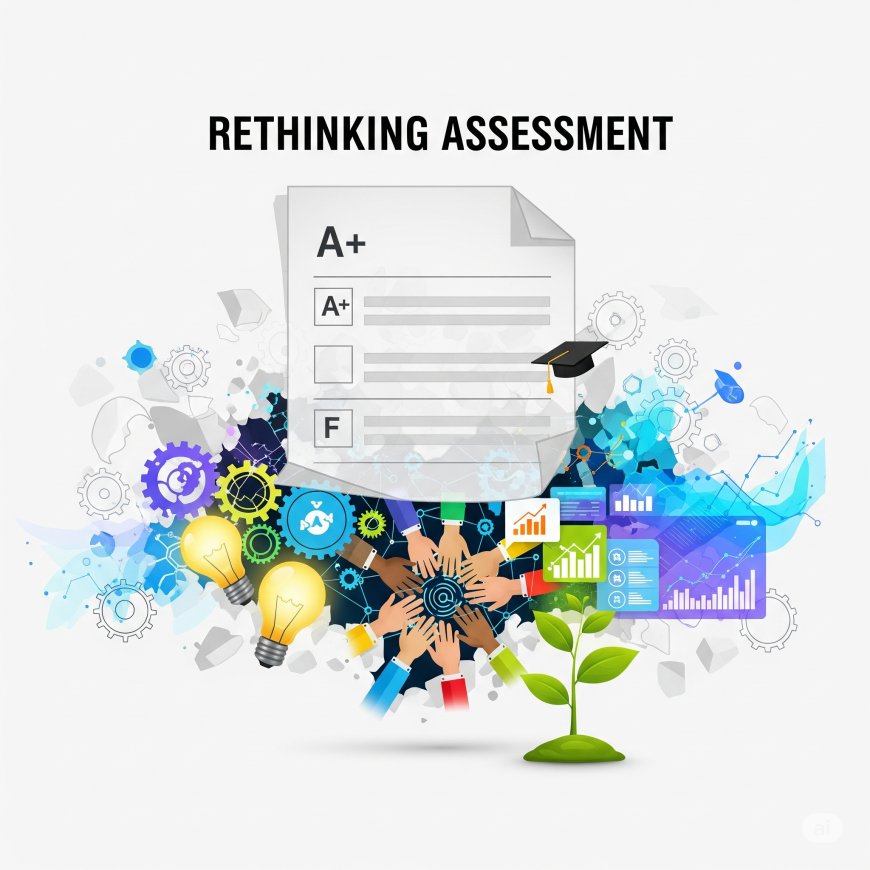Rethinking Assessment in Modern Education
Explore the evolving landscape of educational assessment, moving beyond traditional tests to embrace holistic, authentic, and continuous evaluation methods. This article discusses the critical need for assessment reforms that truly reflect learning, foster skill development, and prepare students for the complexities of the 21st century.

Article: Rethinking Assessment in Modern Education: Beyond the Test Score
The traditional model of educational assessment, heavily reliant on high-stakes standardized tests and periodic examinations, is increasingly being questioned in the context of modern education. In a world that demands critical thinking, creativity, collaboration, and adaptability, our assessment methods often fall short, measuring rote memorization more than genuine understanding or applied skills. Rethinking assessment is not merely about changing how we grade, but fundamentally shifting how we understand, measure, and support student learning in a dynamic 21st-century landscape.
The Limitations of Traditional Assessment
While traditional summative assessments (like end-of-year exams) have their place in evaluating knowledge recall, they often present several limitations:
-
Narrow Focus: They tend to measure a limited range of cognitive skills, primarily recall and recognition, neglecting higher-order thinking, problem-solving, and practical application.
-
High Stakes, High Stress: The pressure associated with single, high-stakes tests can induce anxiety, hinder true learning, and may not accurately reflect a student's full capabilities.
-
Lack of Feedback for Learning: Summative assessments often provide little timely, actionable feedback for students to improve, as they occur at the end of a learning unit.
-
Inequity: Standardized tests can inadvertently penalize students from diverse backgrounds due to cultural biases, language barriers, or lack of exposure to specific test-taking strategies.
-
Decontextualized Learning: They often remove knowledge from real-world contexts, making learning feel irrelevant and failing to assess how students apply what they've learned in practical situations.
Why Modern Education Demands a Shift
Modern education, particularly in countries like Cambodia striving for human capital development, increasingly emphasizes skills that go beyond mere content knowledge. These include:
-
21st-Century Skills: Critical thinking, problem-solving, communication, collaboration, creativity, and digital literacy.
-
Competency-Based Learning: Focusing on what students can do rather than just what they know.
-
Personalized Learning: Tailoring education to individual student needs, paces, and interests.
-
Growth Mindset: Fostering the belief that abilities can be developed through dedication and hard work, which traditional grading can sometimes undermine.
To truly foster these outcomes, assessment must evolve from a mere judgment of learning to an integral part of the learning process itself.
Key Principles of Rethinking Assessment
A more holistic and effective approach to assessment in modern education embraces the following principles:
-
Assessment FOR Learning (Formative Assessment): This is perhaps the most crucial shift. Formative assessment is ongoing, providing continuous feedback to both students and teachers to adjust teaching and learning in real-time. Examples include quizzes, discussions, observations, and peer/self-assessment, all aimed at guiding improvement, not just assigning a grade.
-
Authentic Assessment (Performance-Based Assessment): Moving beyond multiple-choice questions, authentic assessments require students to demonstrate their understanding and skills in real-world contexts. This can include:
-
Projects: Developing a product, conducting an investigation.
-
Portfolios: Collections of student work demonstrating growth over time.
-
Presentations: Explaining concepts, defending arguments.
-
Simulations/Role-Plays: Applying knowledge in practical scenarios.
-
Performance Tasks: Completing a specific task that mimics real-world challenges.
-
-
Competency-Based Assessment: Instead of simply assigning grades, this approach focuses on whether a student has mastered specific competencies or learning objectives. Students progress once they demonstrate proficiency, allowing for individualized pacing and targeted support.
-
Feedback-Rich Culture: Assessment should be primarily about providing constructive, timely, and actionable feedback that helps students understand where they are, where they need to go, and how to get there. This involves teaching students how to give and receive feedback effectively.
-
Student Voice and Self-Assessment: Empowering students to take ownership of their learning by engaging them in self-assessment, goal-setting, and reflection. This fosters metacognition – thinking about one's own thinking and learning processes.
-
Digital and Adaptive Assessment: Leveraging technology to create more engaging, personalized, and efficient assessments. Digital tools can provide immediate feedback, track progress over time, and adapt to a student's learning level, making assessment more efficient and insightful.
-
Balanced Approach: While traditional summative assessments still have a role in certifying learning outcomes, they should be balanced with a rich array of formative and authentic assessments that inform and enhance the learning journey.
Implementing Assessment Reform
Implementing these changes requires significant shifts in educational policy, teacher training, and school culture:
-
Professional Development for Teachers: Equipping educators with the skills and knowledge to design and implement diverse assessment methods, interpret data, and provide effective feedback.
-
Curriculum Alignment: Ensuring that assessment methods are aligned with learning objectives that emphasize 21st-century skills and deeper understanding.
-
Parent and Community Engagement: Educating stakeholders about the value of different assessment approaches and how they contribute to a more holistic understanding of student progress.
-
Technological Infrastructure: Investing in digital tools and platforms that support diverse assessment methods and data analysis.
-
Policy Support: Creating frameworks that encourage innovation in assessment while maintaining accountability.
Conclusion
Rethinking assessment in modern education is not a luxury, but a necessity for preparing students for an unpredictable future. By moving beyond a narrow focus on test scores and embracing a more holistic, authentic, and continuous approach, we can transform assessment from a dreaded event into a powerful tool for learning, growth, and empowerment. This shift enables us to truly measure what matters, cultivate essential skills, and ensure that every student is equipped not just with knowledge, but with the ability to apply it, adapt, and thrive in an ever-evolving world.
What's Your Reaction?
 Like
0
Like
0
 Dislike
0
Dislike
0
 Love
0
Love
0
 Funny
0
Funny
0
 Angry
0
Angry
0
 Sad
0
Sad
0
 Wow
0
Wow
0




















